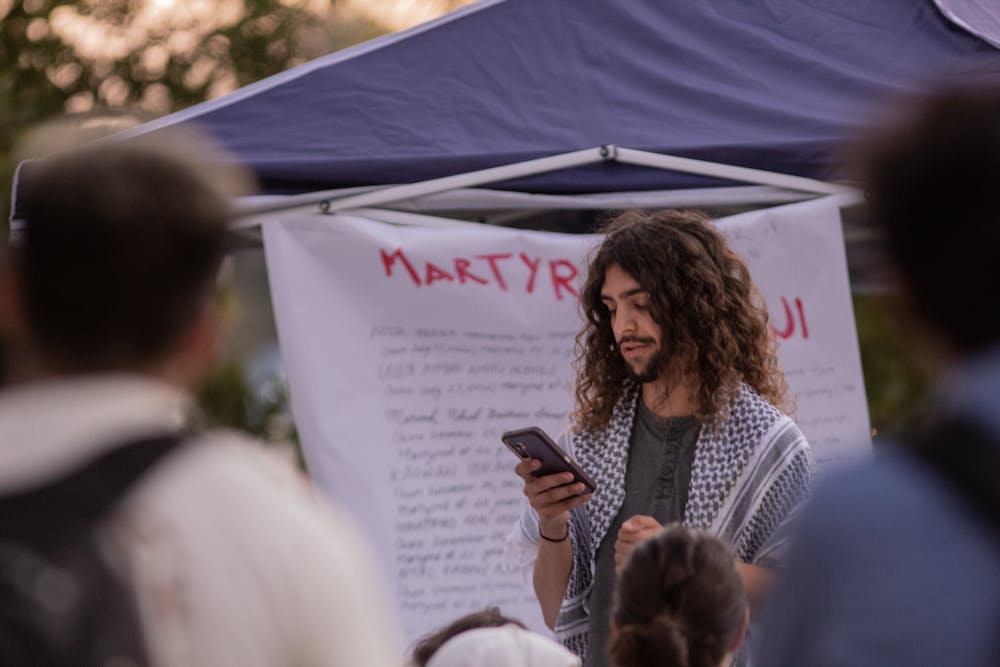Rice Students for Justice in Palestine remembers a ‘year of genocide’

Reflecting upon a “year of genocide,” Rice Students for Justice in Palestine hosted a vigil Oct. 7, honoring the tens of thousands of Palestinians killed since last year’s attacks on Israel.
In front of the provisional campus facilities’ tents, students, alumni and faculty shared poetry, speeches and stories. Videos of tarps and hands assembling fabrics were projected on the tent — reflective of the ongoing community-building efforts in the space, said Rice SJP organizer Erica Augenstein.
Later that evening, Chabad at Rice also led a vigil remembering the Oct. 7 attacks.
The vigil capped off Rice SJP’s “Day of Rage” and launched a series of demonstrations — dubbed a “Week of Rage” by the national chapter of SJP — in solidarity with Palestine. Events include a city-wide protest, study groups and teach-ins held throughout the week.
Before the vigil, Augenstein, a history Ph.D. student, led a presentation on the history of territorial disputes in Palestine. Nick Cooper ’91 also spoke about his work in community organizing during his time at Rice.
This week’s programming arrives months after student protests about the Israel-Hamas war swept universities — and as campuses brace themselves for a resurgence.
Abdel Razzaq Takriti, an associate professor of history and the Arab-American Educational Foundation Chair in Arab studies, shared the story of Rasha, a 10-year-old Gazan girl who wrote her own will distributing her allowance, toys and belongings among her family.
“In her will … a 10-year-old child asked her family not to cry over her,” Takriti said. “Her final request was that her brother, Ahmed, not be shouted at.”
Rasha’s story stands in “stark contrast” to the “complete lack of care for Palestinian life that we witness,” Takriti said in his speech.

Rice alumna Kathryn Jarjoura spoke after Takriti, reflecting upon her Lebanese heritage and its parallels to Palestine. Last month, Israel escalated its attacks in Lebanon, where over 2,000 people have been killed in the last year — most in the past two weeks, Reuters reported.
weeks, Reuters reported.
Both Lebanon and Palestine are “more than just a battlefield, like Western media likes to portray … [their people are fighting for] the right to exist in the land of [their] ancestors,” Jarjoura said in her speech.
Before reading two poems honoring Palestinians, Matti Haacke, a Rice SJP organizer and Sid Richardson College senior, shared a 650-page list naming those killed in Gaza over the past year. He passed the stack of papers to attendees as he began the poem recitations.
Fouad Salah, an organizer with the Palestinian Youth Movement and a University of Houston SJP chapter alumnus, spoke about the international community that Gaza has built over the last year.
“It’s hard to think of a reflection on the last year of genocide because it’s not past tense,” Salah said. “I think we can start by reflecting on what Gaza has done; it has chosen freedom in the face of the most technologically advanced weapons that have ever been created.”
Salah, who is ethnically Palestinian and from Jerusalem, said this year has reaffirmed that the “Palestinian people will not be defeated” and “they will give anything to defend their honor, their dignity and their national history on that land” in an interview with the Thresher.
“The people of Gaza have shown us that if they can stand with their head held high on their land as U.S.-made bombs drop on them, then we, as taxpaying American citizens, can confront U.S. imperialism and can confront genocide, and can do everything in our power to end the genocide,” Salah said during the vigil.
Daanesh Jamal, who attended the vigil, said he was saddened and overwhelmed by the long, yet incomplete, list of people killed in Gaza. He said one of the student-recited poems, “Tonight we die as a family,” affected him deeply.
“In Gaza, they’ve had to invent a new acronym amongst medical staff, WCNSF — wounded child, no surviving family — and just the idea that there’s just this kid there, and then [their] entire family has been killed, and it’s just wandering the rubble. It’s just so heartbreaking,” Jamal, a Will Rice College senior, said.
Salah ended the vigil by reading the names of the first 100 infant names in the list of Gazan deaths. After each name, he asked the audience to say shaheed, Arabic for “martyr.” According to Islamic belief, martyrdom represents “defending justice and fighting for justice,” he said.
“And as we leave tonight, let each name we read,” Salah said, “all the names that the Gaza Health Ministry could never capture because they’re still under the rubble, guide us to continued action, to continued commitment and dedication to freedom, justice and liberation for Palestine and the Palestinians.”
Sarah Knowlton contributed reporting.
More from The Rice Thresher

Andrew Thomas Huang puts visuals and identity to song
Houston is welcoming the Grammy-nominated figure behind the music videos of Björk and FKA twigs on June 27.

Live it up this summer with these Houston shows
Staying in Houston this summer and wondering how to make the most of your time? Fortunately, you're in luck, there's no shortage of amazing shows and performances happening around the city. From live music to ballet and everything in between, here are some events coming up this month and next!

Rice to support Harvard in lawsuit against research funding freeze
Rice, alongside 17 other research universities, filed an amicus curiae brief in support of Harvard University’s lawsuit against the Trump administration over more than $2 billion in frozen research grants.

Please note All comments are eligible for publication by The Rice Thresher.